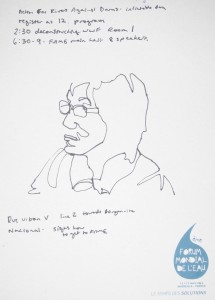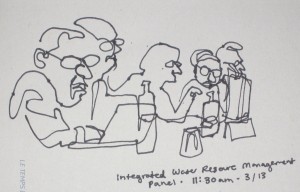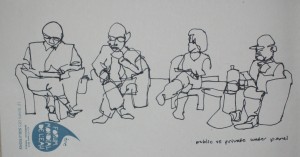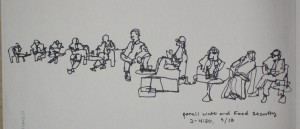After a long Tuesday sitting in very tense debate sessions regarding private sector partnerships, Wednesday was the opposite. Our hostel knows a local guide who takes tourists into the nearby mountains to hike and talk about the local ecology of the area, and luckily Lisa found out about him and got him to give us a tour. The area is in the last stages of becoming Calanques National Park, and will be the only rural/urban national park in France.
The Calanques rise from the sea in spectacular limestone peaks, giving Marseille a unique skyline. Nabilus met us at the entrance of the park, and we began our ascent through a small village. I think our eagerness to be outside was a bit of an early morning shock for him and he told us that we needed to take it slow, as it was the morning. Slowly we wound our way up the former seabed peaks, pausing to admire the beautiful plants and learn from Nabilus what was edible. As we continued to rise above the city, the view became more and more spectacular, and with each step the tension from the past three days began to leave.
As the sun rose higher, lunch became our focus. When I thought we had reached a peak, we took a sharp left, seemingly off the side of the mountain, and around the corner was the ruins of a German occupied base from World War II.
We had packed a lunch of fresh bread, cheese, nuts and fruit, which was enough to satisfy our every whim, but Nabilus had brought us food that was beyond description. With the herbs found in the park (white thyme, two types of rosemary and others) he had created a magical olive oil. He provided dried baguette rubbed with fresh purple garlic; we poured the oil over and with oily hands ate the little bruschettas. When we thought we were in food heaven, he pulled out a small wheel of Camembert cheese and sliced it into large triangles. Then, much to our shock he liberally poured his olive oil over the cheese. To skeptics of this endeavor, I can safely tell you that any thought of my arteries disappeared, and at once I was encompassed in one of the most delicious culinary delights I have ever experienced. We contentedly munched on our lunch, and Nabilus answered our questions about the city, ecology, and how he came to love the area. It became clear that his passion is these mountains and educating tourists and citizens alike in the marvel that lies within the city. We zigged and zagged our way down and across the mountain stopping to examine an old venting system from an old ascorbic acid factory. At the bottom we parted ways with Nabilus and wandered down to the ocean to dip our toes into the Mediterranean. After a long day hiking the cold (yes, cold!), refreshing water was exactly what we needed to continue back to the Water Forum and hear from the Youth Movement.
All posts in 6th World Water Forum
Mid-week Stress Relief
Thoughts on grammar at the World Water Forum
Ken Cline
I have developed an adjective-noun problem. I wrote in an earlier entry that “words matter.” I was thinking about that even more today. It wasn’t even because we have been discussing the wording of proposed statements late into the night or that I have been spending time with Rachel (for whom English grammar is a contact sport). No, I was just sitting in a presentation listening to people talking about the “green economy”, “green growth”, ”sustainable development”, and “sustainable hydropower.” This has been a week chock full of these kind of terms. And they aren’t so bad; a green economy is better than a black or brown one and I understand why some would see these phrases as a great step forward.
But I can’t help but thinking that with all of these terms, the emphasis (sometimes silent, sometimes not) is always on the noun – economy, growth, development, hydropower. It explicitly says that these are the things that we want, but we will try to temper their impact, thus the adjective. To the extent that these phrases contain a vision, the vision seems to be only contained in the noun (with a little qualification added on). As a result, the much celebrated Rio +20 conference this June is focusing on the (green) economy, not justice, not health, not the environment, not well-being. The economy is important and green is my favorite color for economies and lots of other things. But that is not my vision, that is not my emphasis and if we are going to bring together 50,000 people around an important vision – I want a different noun front and center.
Outlining the Panels
- Robin Owings
As I sit in long meetings on water privatization, scarcity, and ethics, I have taken to documenting panelists (government officials, NGO heads, citizen leaders) with blind contour drawings. I look directly at the subjects and record them using a continuous line. Each line forms a caricature, reflecting the elements of those figures such as slouching shoulders, facial expressions, and hand gestures which I perceive (often on a subconscious level) to be important. I am sharing these sketches with Earth in Brackets to describe the dynamics and experience of these panels through a different format, because they often illustrate more about the individuals than I could say through writing.
Panel 1. Integrated Water Resource Management For All: Make Water Resource Planning a Reality by adopting IWRM (Master) Plan
Panel 2. Water Debate: Private/Public Involvement in the Provision of Water and Sanitation Services

Panel 3: detail of Maria Theresa at the Alternative World Water Forum preparatory meeting
Panel 4. High Level Panel on Water and Food Security
The Perils of Privatization
-Rachel Briggs
Earlier in the week several of us attended a debate on whether water supply should be private or public: Is it appropriate for private, for-profit companies to allocate a resource essential to life, or is that a role only public providers can play ethically? The panel included Gerrard Payen, president of AquaFed, a consortium of private water providers. As he suavely spun his way through the debate extolling the benefits of private control of water services, I was struck by the counterexample the World Water Forum itself provided to his arguments. Unlike UN-sponsored meetings, the World Water Forum is run by a private entity – the World Water Council. At best, it is a public-private partnership with all the limitations that come with the territory. For instance…
1. Private provision is more efficient because companies have to be competitive.
The World Water forum does not function efficiently. Their WiFi lounges are guaranteed to lack wireless, and there are no computers available for public use. The Forum also has no Spanish translators, creating yet another barrier to participation. Although perhaps one could consider their first aid station efficient—they were quite thrifty, I had to carefully wheedle two band-aids from the medics this afternoon for Barbara’s blisters. They were, on the other hand, happy to give us mountains of plastic items with the WWF logo for free. I’m sure the costs balance out.
2. Private providers are simply doing the job they were asked to do by the public sector, and only have jobs so long as they satisfy the needs of consumers.
As the above examples exemplify, the needs of participants—especially less affluent ones—are not fully met. This includes the dire need for discussion around issues of access, commodification, and the future of water governance. Events are structured as lectures rather than conversations, and more radical voices have been pushed out of the forum by high registration costs and highly regulated interactions. Youth have been repackaged as young professionals rather than voices for radical change. But these disenfranchised voices are not in position to shift the Forum structure, and they continue to do the job they were asked to do by the private sector.





